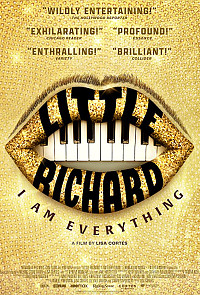| SHADOWS ON THE WALL | REVIEWS | NEWS | FESTIVAL | AWARDS | Q&A | ABOUT | TALKBACK | |||||||||||||||||||||||||||||
 Shadows off the beaten path Shadows off the beaten pathIndies, foreign, docs and shorts...
On this page:
LITTLE RICHARD: I AM EVERYTHING |
LOVING HIGHSMITH |
THE STROLL
| |||||||||||||||||||||||||||||
| See also: SHADOWS FILM FESTIVAL | Last update 9.Apr.23 | |||||||||||||||||||||||||||||
|
Little Richard: I Am Everything Review by Rich Cline |  MUST
MUST  SEE SEE
SUNDANCE FILM FEST  Now streaming...
| 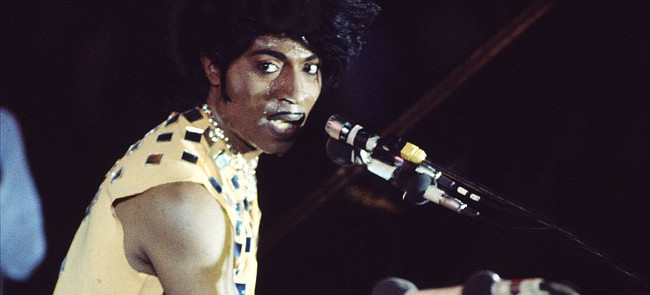 This essential documentary traces the outrageous life of the colourful artist who pioneered rock 'n' roll music and continues to influence performers today. Little Richard was always open about his sexuality and religion, and filmmaker Lisa Cortes skilfully explores the tension between them, while allowing his outsized personality to shine in extensive interview and performance clips. But what's most striking is how we still see him absolutely everywhere. After a religious upbringing in rural Georgia, Richard Penniman was thrown out of his home for being gay. He began performing in the late 1940s, mixing gospel with blues and boogie to create his own sound, then adding flamboyant looks borrowed from various fellow artists like Billy Wright. Adapting a filthy ditty into the punchy single Tutti Frutti, he basically launched a new genre. But even though he had chart success, executives re-recorded his songs with white musicians like Pat Boone and Elvis Presley. But Richard appealed to integrated audiences, and became a mainstream star. Over the years, Richard repeatedly rejected his hedonistic rockstar life to return to the church, becoming a preacher and even marrying Ernestine to distance himself from his sexuality. But he always returned to performing in his inimitable style. Along the way, he worked with the likes of the Beatles, Rolling Stones and Jimi Hendrix before they found their own fame. His influence is overwhelmingly clear on artists ever since, from David Bowie to Michael Jackson, Boy George, Prince, Lil Nas X and Harry Styles. Cortes keeps the film moving at a brisk pace, unfolding the story chronologically, narrated by Richard himself in archival recordings. Alongside this is commentary from artists who were inspired by him and worked with him. Terrific historical footage is mixed together with illustrative period clips to vividly evoke details along the way. And the film includes a fabulous wide range of musical performances that remind the viewer just how ahead of his time Richard was. Indeed, this doc continually shows this man's unusual impact on culture, and the fact that he was black and queer is vital to the story. This is why he is only now being recognised for his contribution to the industry, as the officials continually tried to divert attention to more "acceptable" role models. And Richard himself struggled to accept himself due to ingrained religious beliefs. So even if his life was troubled and perhaps derailed, this man was a force of nature who altered the landscape through his sheer force of personality.
|
| Loving Highsmith Review by Rich Cline | 
| 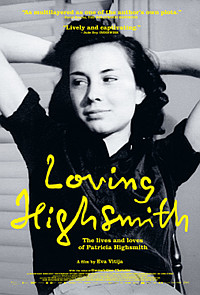 dir-scr Eva Vitija prd Franziska Sonder, Maurizius Staerkle Drux with Patricia Highsmith, Marijane Meaker, Monique Buffet, Tabea Blumenschein, Courtney Coates Blackman, Judy Coates, Dan Coates voices Gwendoline Christie, Annina Butterworth release US 2.Sep.22, UK 14.Apr.23 22/Switzerland 1h23  Now streaming...
| 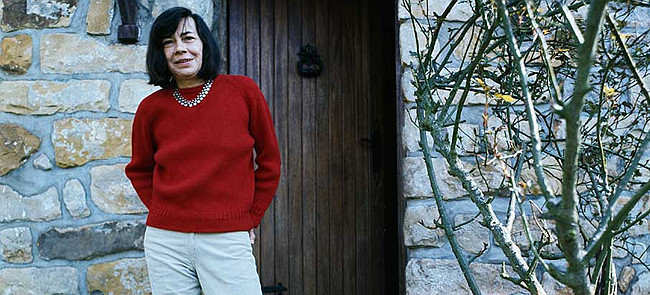 With this biographical documentary, Swiss filmmaker Eva Vitija takes an engaging approach that focusses on author Patricia Highsmith's personal life more closely than her work as a writer. So the film is packed with lovely firsthand observations and anecdotes that contextualise Highsmith's writings. Cleverly augmented with voiceovers from her diary entries, this is an engaging portrait of how Highsmith's love for a series of women fuelled her books. Born in Texas, Patricia moved to New York as a teen and had a badly strained relationship with her mother. This led to periods of depression and alcoholism. Her cinematic writing style led to most of her books becoming films, starting with Hitchcock's 1951 classic Strangers on a Train. Because homosexuality was underground at the time, she wrote her groundbreaking lesbian novel The Price of Salt (aka Carol) under a pseudonym, then moved to Europe and began the five Ripley novels. And all of her writing was influenced by a series of troubled romantic relationships. Interviewees provide deeply personal observations, most notably the straight-talking, hilariously deadpan Meaker. Audio interviews with Highsmith are mixed with voiceover readings by Christie from her diaries. The cameras also visit places she lived in Texas, Manhattan, England, France and Switzerland, where she died at 74 in 1995. All of this puts her life into terrific context, revealing connections between her friendships, family issues, relationships and stories. While only attracted to women, her romances were intense, short and rocky. And along the way she tried to cure herself of her homosexuality using both therapy and disastrous relationships with men. She was outed by her mother when she discovered a copy of her "girl book" Carol, then cut ties with her family. And it wasn't until 1990 that Highsmith finally publicly claimed Carol as hers; it's her only book that features no violent crime, and a rare gay novel with a happy ending for its characters. While the film meanders a bit, writer-director Vitija beautifully isolates Highsmith's creative process. To her, a new idea felt like a bird flitting in the corner of her eye, and was only sometimes worth investigating further. All of her work has a queer sensibility, recognising the commonality for homosexuals as survivors. And yet her diaries also include bitter racism. But perhaps this film's most inspiring point is Highsmith's belief that imagination makes life unlimited.
|
| The Stroll Review by Rich Cline | 
| 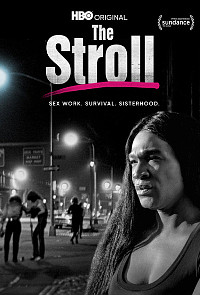 dir Zackary Drucker, Kristen Lovell prd Matt Wolf with Kristen Lovell, Ceyenne, Carey, Elizabeth, Stephanie, Lady P, Egyptt, Cashmere, Tabytha, Sylvia Rivera, RuPaul Charles, Rudy Giuliani, Mike Bloomberg release UK Mar.23 flare 23/US 1h24 SUNDANCE FILM FEST  Now streaming...
| 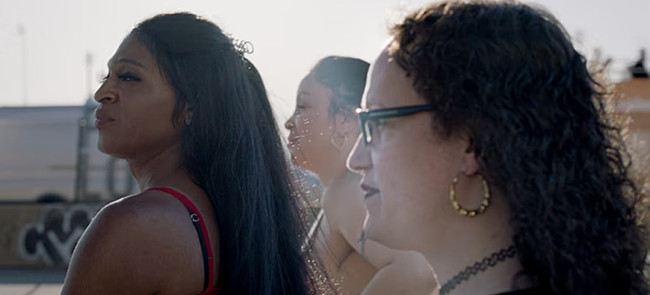 Documenting a specific period in New York's queer scene, this film has a sense of urgency that's impossible to escape. These are the stories of real people who transcended circumstances to make a huge impact while battling hateful bigotry. Working with the gifted Zackary Drucker, filmmaker Kristen Lovell bravely puts her life on the screen, revealing the humanity of transgender sex workers who are still seeking basic human rights. In the 1990s, Kristen began working the Stroll, a red-light district in Manhattan's Meatpacking District, alongside other trans women of colour. Thrown out by their families and unable to find other work due to their gender, they created a family, protecting each other from customers who were violent and devising clever ways to hide from the increasingly brutal police. As the city attempted to erase them from existence, they rose up in protest alongside iconic activists like Sylvia Rivera. Their tireless work advanced equality for gay people, but the trans community is still under attack. Lovell and Drucker give the film a snappy pace and joyous tone, focussing on the camaraderie between these lively women. Each of them shares astonishing stories without flinching, laughing at the absurd details of this time in their lives, but clearly relishing memories of how free they felt in defying the hateful people around them. Most impressive is how the film never shies from the darker aspects of their experiences while correcting the false history that these women were the villains. The film also knowingly documents the results of the ruthless crackdown by mayors Giuliani and Bloomberg over the past 15 years or so, as the neighbourhood has been thoroughly gentrified, turning it into yet another gleaming collection of overpriced flats and cafes that's trying to scrub away its roots. The seedy bars and hookers are gone, and so are most of the meatpacking companies. And it's inspiring that Lovell and Drucker so determined to make sure that the area's past remains on the record. Lovell's personal connection gives this documentary an extra-strong kick. Using archival video footage and eye-catching animation, she and her friends tell their own stories, then explore what it all means. And as they revisit their old stomping grounds, the emotional connection is vivid: while hundreds of women didn't survive, the ones on-screen have left the streets behind to become LGBTQ community leaders. Their lives are fascinating and important, and they leave us wanting to know more.
| 
See also: SHADOWS FILM FESTIVAL © 2023 by Rich Cline, Shadows
on the Wall
HOME | REVIEWS | NEWS | FESTIVAL | AWARDS
| Q&A | ABOUT | TALKBACK | | ||||||||||||||||||
